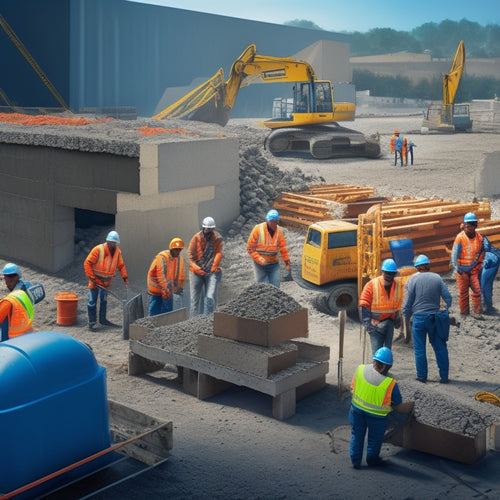
10 Tips for Renting Concrete Cutting Tools Wisely
Share
When renting concrete cutting tools, you'll need to plan carefully to guarantee a successful project. Start by setting clear project objectives, including scope, timeline, and budget, to select the right equipment. Choose the right tool type based on cut type, area size, and concrete thickness, and inspect tools before renting to verify functionality and maintenance history. Consider operator expertise and safety equipment needs, and compare rental prices carefully to avoid hidden fees. By following these tips, you'll be well on your way to a cost-effective and efficient rental experience, and understanding the finer details of each tip can make all the difference in achieving your project goals.
Key Takeaways
• Set clear project objectives to determine the right equipment, timeline, and budget for the job.
• Choose the right tool type based on cut type, area size, and concrete thickness to ensure optimal results.
• Inspect tools before renting and review rental agreements to understand terms, conditions, and maintenance responsibilities.
• Compare rental prices carefully, considering total costs, hidden fees, and pricing variations based on tool type and quality.
• Ensure operator expertise and safety by evaluating operator familiarity, identifying training needs, and planning for necessary safety equipment.
Set Clear Project Objectives
Before renting concrete cutting tools, define your project's scope, timeline, and budget to ascertain you select the right equipment for the job. This essential step will save you time, money, and frustration in the long run.
You'll need to determine the type and quantity of concrete to be cut, the complexity of the cuts, and the surface finish required. Establishing a realistic project timeline will help you plan your equipment rental period and guarantee you have the tools when you need them.
Budget considerations are also critical, as they'll impact the type and quality of equipment you can rent. Make sure to factor in additional costs, such as delivery, fuel, and maintenance.
Choose the Right Tool Type
With your project objectives in place, you can now focus on selecting the right concrete cutting tool type that aligns with your project's specific requirements.
When choosing a tool, consider the tool selection criteria, including the type of cut you need to make, the size of the area to be cut, and the thickness of the concrete.
Cutting depth considerations are also essential, as you'll need a tool that can handle the required depth of cut. For instance, if you need to cut through thick concrete, you may require a tool with a high cutting capacity, such as a diamond saw or a wire saw.
On the other hand, for smaller, more precise cuts, a handheld saw or a floor saw may be more suitable.
Additionally, think about the power source you'll need, whether it's electric, gasoline, or hydraulic.
Inspect Tools Before Renting
Once you've selected the right tool type for your project, it's vital that you inspect the tools you're about to rent to confirm they're in good working condition. You don't want to risk delays or safety hazards due to faulty equipment.
Check the tool's exterior for signs of wear, rust, or damage. Look for any cracks, dents, or corrosion on the blades, handles, or other components. Verify all moving parts are functioning smoothly, and there are no signs of excessive wear on the bearings or seals.
It's also important to review the rental agreements to understand your responsibilities in maintaining the tool's condition during the rental period. Check if the agreement specifies any requirements for tool maintenance, cleaning, or storage. Make sure you understand the process for reporting any issues or damages to the tool.
Check Rental Period Flexibility
You'll want to confirm the rental period flexibility to guarantee it aligns with your project's timeline and scope. This is vital to make sure you have the concrete cutting tools for the duration needed, without incurring unnecessary costs.
Be sure to ask about the rental duration options, including daily, weekly, or monthly rates, and determine which one best suits your project's requirements.
Additionally, inquire about the pricing options for extended rentals. Some rental companies may offer discounts for longer rental periods, while others may charge extra for shorter durations. It's important to understand the pricing structure to make an informed decision.
You should also ask about the flexibility to adjust the rental period if your project timeline changes. Can you extend or shorten the rental duration if needed? Are there any penalties for early returns or late pickups?
Consider Operator Expertise Needed
When renting concrete cutting tools, you'll need to assess the level of operator expertise required to safely and effectively operate the equipment.
You should consider the tool familiarity level of your operators and identify any operator training needs to guarantee a successful project.
Tool Familiarity Level
Your concrete cutting project's success heavily relies on the operator's familiarity with the rented tools, as inadequate expertise can lead to safety risks, equipment damage, and project delays.
When renting concrete cutting tools, it's important to assess your tool experience and consider user feedback. You should honestly evaluate your proficiency with similar tools and identify any knowledge gaps. This will help you determine the level of support you need from the rental company.
If you're new to concrete cutting, it's vital to choose tools with user-friendly interfaces and intuitive controls. Look for tools with built-in safety features and clear operating instructions.
Additionally, consider renting from companies that offer thorough user manuals, online tutorials, or on-site training. This will help you quickly get up to speed with the equipment and minimize the risk of accidents or errors.
Operator Training Needs
Evaluating your tool familiarity level also helps identify operator training needs, as it becomes clear what expertise is required to safely and effectively operate the rented concrete cutting tools.
You'll want to assess your team's current skills and knowledge to determine if additional training is necessary. This is especially important if you're renting advanced or specialized equipment.
Consider operator certification programs that provide hands-on training and instruction on proper safety procedures and equipment operation. These programs can help guarantee that your operators are competent and confident in their ability to use the rented tools.
Additionally, many rental companies offer training resources, such as online tutorials, operator manuals, and on-site training. Take advantage of these resources to fill any knowledge gaps and guarantee a successful project.
Read and Understand Rental Terms
Before signing on the dotted line, take time to thoroughly review the rental agreement to confirm you understand the terms and conditions that govern the use of the concrete cutting tools.
Failure to do so can lead to unexpected costs and disputes. Pay close attention to the rental period, as it may impact your project timeline. Make sure you're aware of the tool's maintenance responsibilities, as some rental agreements may require you to perform routine checks.
Hidden fees can quickly add up, so scrutinize the agreement for any additional charges. Are there delivery or pickup fees? What about fuel surcharges or equipment damage fees? Clarify any ambiguities with the rental company to avoid surprises.
Don't assume anything – if it's not explicitly stated in the agreement, it's better to err on the side of caution. By carefully reviewing the rental agreement, you'll confirm a smooth and cost-effective rental experience.
Plan for Safety Equipment Needs
As you prepare to rent concrete cutting tools, consider the safety equipment you'll need to protect yourself and others from the hazards associated with operating these powerful machines. Concrete cutting tools can generate high levels of noise, dust, and debris, posing risks to your hearing, vision, and respiratory health. To reduce these risks, you'll need to invest in the right safety gear.
Start by identifying the personal protective equipment (PPE) required for the job. This may include hard hats, safety glasses, earplugs, dust masks, gloves, and steel-toed boots. Make certain that your PPE is certified to industry standards and in good condition.
Don't overlook the importance of proper ventilation and dust suppression systems to minimize airborne contaminants. Additionally, consider the safety features of the concrete cutting tools themselves, such as emergency stop mechanisms and protective guards.
Compare Rental Prices Carefully
When researching rental options, you'll find that prices for concrete cutting tools can vary greatly depending on the type, quality, and duration of the rental, so it is essential to carefully compare prices to get the best value for your project.
To make an informed decision, create a side-by-side comparison of the prices and services offered by different rental companies. Consider factors such as the daily or weekly rental rate, additional fees for delivery or maintenance, and the quality of the equipment. Don't forget to ask about any discounts or promotions that may be available.
Here's a sample comparison table to get you started:
| Rental Company | Daily Rental Rate |
|---|---|
| ABC Equipment Rentals | $200 |
| Concrete Cutting Pros | $180 |
| Diamond Blade Rentals | $220 |
Check Tool Maintenance History
Proper tool maintenance is essential to guarantee the concrete cutting equipment performs at its best and safely. Therefore, you should verify the rental company's maintenance history and records for the specific tools you're interested in renting.
This step is vital in ensuring tool reliability, as poorly maintained equipment can lead to breakdowns, accidents, or subpar performance. When checking maintenance records, look for documentation of regular servicing, such as oil changes, filter replacements, and blade sharpening.
Also, ask about the frequency of equipment inspections and any repairs made. A reputable rental company should be transparent about their maintenance procedures and provide you with detailed records.
Don't hesitate to ask questions or request additional information if you're unsure. By doing so, you'll get a better understanding of the tool's condition and can make an informed decision about the rental.
Ask About Additional Services
You should inquire about additional services offered by the rental company, such as operator training, on-site support, or equipment delivery, to guarantee a hassle-free and efficient concrete cutting experience. These services can be valuable, especially if you're new to concrete cutting or need specialized equipment.
When asking about additional services, be sure to also inquire about any additional fees associated with them. You don't want to be surprised by unexpected costs.
Here are some key questions to ask:
-
What's the cost of tool delivery, and are there any discounts for longer rental periods?
-
Are there any additional fees for on-site support or operator training?
-
Are there any package deals that include multiple services at a discounted rate?
Frequently Asked Questions
Can I Rent Concrete Cutting Tools for a Short Period of Time?
You can definitely rent concrete cutting tools for a short period of time.
Many equipment rental companies offer short term rentals, usually by the day or week. This flexibility is great for one-time projects or when you need a specific tool for a limited time.
Check the tool availability at local rental companies to verify they've what you need. They'll guide you through the rental process and provide the necessary equipment for your project.
Are Rental Tools Always in Good Working Condition?
When you rent concrete cutting tools, you expect them to be in good working condition.
Typically, rental companies prioritize tool maintenance to guarantee their equipment is reliable and efficient. Before handing over the tools, they conduct thorough rental inspections to identify and fix any issues.
You can also do your part by inspecting the tools upon receipt and reporting any problems. This way, you can focus on getting the job done with confidence.
Do Rental Companies Provide Operator Training or Guidance?
When you rent concrete cutting tools, do you get the operator training you need?
Typically, rental companies provide some level of guidance, but it's crucial to ask about operator certification and training resources.
They might offer on-site demos, instructional videos, or even classroom training.
Don't assume you'll get thorough instruction, though - take charge and ask about their support to guarantee you're using the tools safely and effectively.
Can I Customize the Rental Package to Suit My Project Needs?
When you're planning a project, you'll likely have specific requirements that need to be met.
Fortunately, you can customize your rental package to suit your project's unique needs.
You'll find that many rental companies offer flexible rental package options that can be tailored to your project's specific requirements.
What Happens if the Rented Tool Breaks Down During the Project?
When your rented concrete cutter suddenly goes dark, like a fallen giant, you're left wondering who's responsible for the downtime.
Don't let the project grind to a halt - check your rental agreement for insurance coverage. Typically, the rental company absorbs repair responsibilities, but it's essential you understand the terms.
Review your contract to see who's on the hook for fixing or replacing the broken tool, so you can get back to cutting through concrete like a hot knife through butter.
Conclusion
As you commence your concrete cutting project, remember that renting the right tools is just the beginning.
Like a medieval knight gearing up for battle, you must be prepared for the challenges ahead.
By following these 10 tips, you'll be well-armed to tackle even the toughest concrete cutting tasks.
With the right tools and a clear plan, you'll be cutting through concrete like a hot knife through butter, and your project will be a resounding success.
Related Posts
-

Smart Guide to Buying Used Concrete Hand Tools
You're about to buy used concrete hand tools, and you need to get it right. Dedicate time to identify the tools you n...
-

Essential Tools for Concrete Wall Covering Projects
When tackling a concrete wall covering project, you'll need a range of essential tools and equipment. For cleaning an...
-

7 Best Tools for Concrete Block Construction
You'll need a solid foundation, precise cutting, and seamless finishing to guarantee your concrete block construction...


